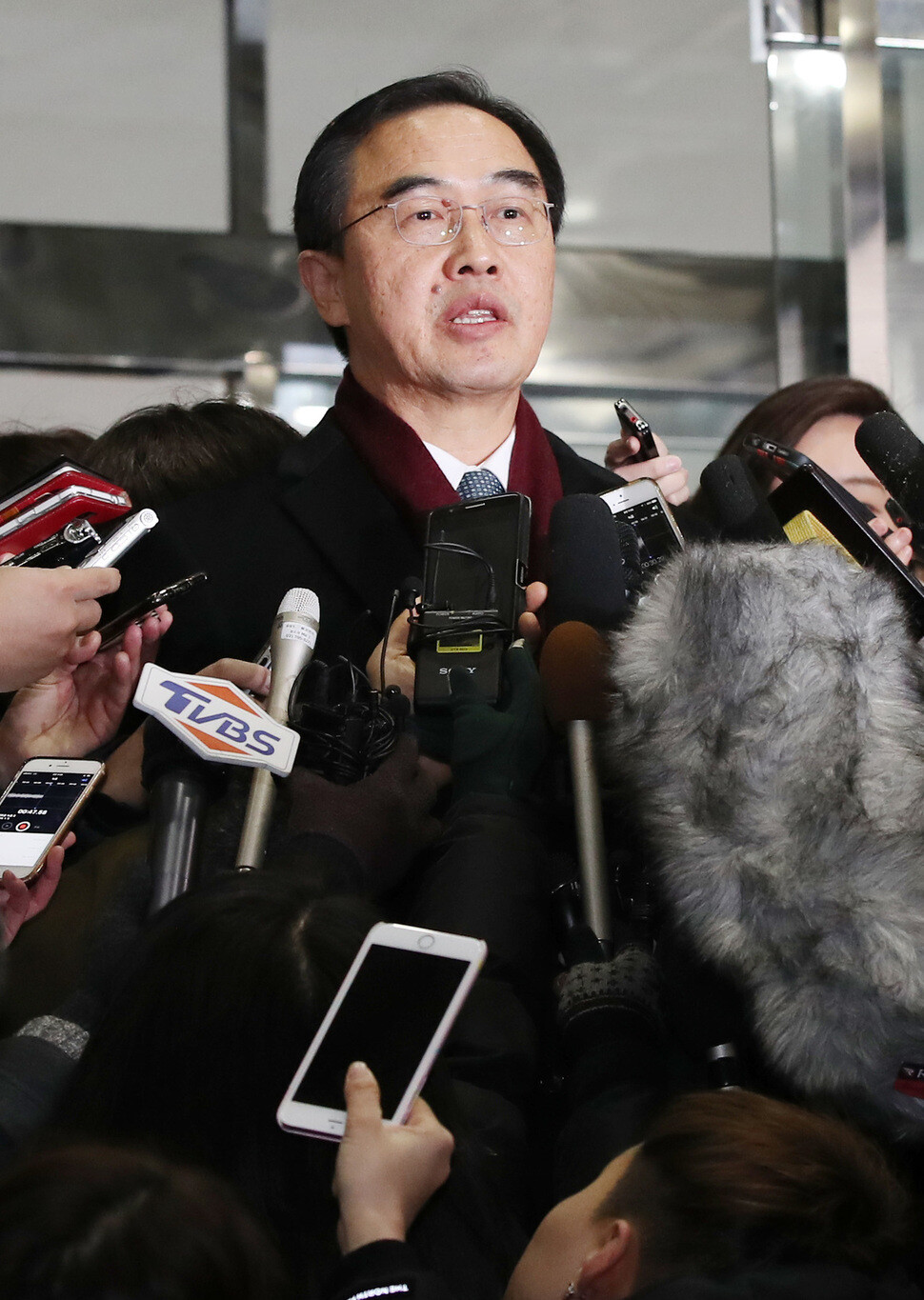hankyoreh
Links to other country sites 다른 나라 사이트 링크
[Editorial] Inter-Korean talks are opportunity to move peninsula toward peace

High-level talks between South and North Korean government authorities took place on Jan. 9 at Panmunjeom’s Peace House, with North Korean lead representative Ri Son-gwon terming them, “a New Year’s gift to the entire nation.” The talks were the first to take place in more than two years, and are likely to prove a major turning point in overcoming a nearly ten-year vacuum and opening up a new chapter in inter-Korean relations.
Preparations have proceeded quickly since North Korean leader proposed the talks in his New Year’s address and South Korean President Moon Jae-in immediately accepted. The North also acceded to the South’s demands on everything including the composition of its delegation – quite a difference from its past quibbling ways. It’s proof of the significance both sides are placing on the talks.
The talks are also benefiting from a favorable climate in the international community. US President Donald Trump’s message of “100% support” for inter-Korean dialogue can be taken as a sign that major changes may be in store for North Korea’s relations with the South and the US, which were previously stuck in a no-way-out situation with antagonism between Pyongyang and Washington. This positive atmosphere raises hopes that if South and North can harness their wisdom, these talks may be a chance to break the vicious cycle of hostility and move toward peace on the peninsula.
At the same time, being too ambitious can easily backfire, and these talks should be approached in terms of first achieving some kind of resolution on practical matters. To begin with, they need to focus on how North Korea will take part in the Pyeongchang Olympics. Merely having the North Korean athletes cross south over the Military Demarcation Line will be a way of showing the rest of the world a commitment to peace on the Korean Peninsula. It’s also highly symbolic to have the South and North Korean athletes entering together at the opening and closing ceremonies. Sending cheering squads or performance groups could be a way for North Korea to draw the public’s attention and positive feelings. Hopefully, these issues can be resolved in a positive way so that the Pyeongchang Olympics become a “peace Olympics” for South and North alike.
It’s also true that while the Olympics may be at the heart of the talks’ agenda, they aren’t the sole issue to be discussed. Last year, the South proposed holding military talks and reunions among divided family members. The Pyeongchang Olympics overlap with Lunar New Year’s, a major holiday for all Koreans. The sense of it being a “peace Olympics” would be all the greater if family members could meet during this time.
Given the emphasis on improving inter-Korean relations in Kim Jong-un’s New Year’s address, we hope North Korea will take active steps in this regard. But since there is a real possibility of future by asking for too much, too quickly, both sides need to approach the talks with restraint and focus on solving the things they can agree upon first. Instead of focusing on difficult issues, it’s important to use the talks as an occasion to build a larger framework for dialogue to continue in the future.
Please direct questions or comments to [english@hani.co.kr]

Editorial・opinion
![[Column] Has Korea, too, crossed the Rubicon on China? [Column] Has Korea, too, crossed the Rubicon on China?](https://flexible.img.hani.co.kr/flexible/normal/500/300/imgdb/original/2024/0419/9317135153409185.jpg) [Column] Has Korea, too, crossed the Rubicon on China?
[Column] Has Korea, too, crossed the Rubicon on China?![[Correspondent’s column] In Japan’s alliance with US, echoes of its past alliances with UK [Correspondent’s column] In Japan’s alliance with US, echoes of its past alliances with UK](https://flexible.img.hani.co.kr/flexible/normal/500/300/imgdb/original/2024/0419/2317135166563519.jpg) [Correspondent’s column] In Japan’s alliance with US, echoes of its past alliances with UK
[Correspondent’s column] In Japan’s alliance with US, echoes of its past alliances with UK- [Editorial] Does Yoon think the Korean public is wrong?
- [Editorial] As it bolsters its alliance with US, Japan must be accountable for past
- [Guest essay] Amending the Constitution is Yoon’s key to leaving office in public’s good graces
- [Editorial] 10 years on, lessons of Sewol tragedy must never be forgotten
- [Column] A death blow to Korea’s prosecutor politics
- [Correspondent’s column] The US and the end of Japanese pacifism
- [Guest essay] How Korea turned its trainee doctors into monsters
- [Guest essay] As someone who helped forge Seoul-Moscow ties, their status today troubles me
Most viewed articles
- 1[Column] The clock is ticking for Korea’s first lady
- 2After 2 months of delayed, denied medical care, Koreans worry worst may be yet to come
- 3[Column] Has Korea, too, crossed the Rubicon on China?
- 4Hong Se-hwa, voice for tolerance whose memoir of exile touched a chord, dies at 76
- 5US overtakes China as Korea’s top export market, prompting trade sanction jitters
- 6[Correspondent’s column] In Japan’s alliance with US, echoes of its past alliances with UK
- 7All eyes on Xiaomi after it pulls off EV that Apple couldn’t
- 8[News analysis] After elections, prosecutorial reform will likely make legislative agenda
- 9Samsung barricades office as unionized workers strike for better conditions
- 10More South Koreans, particularly the young, are leaving their religions